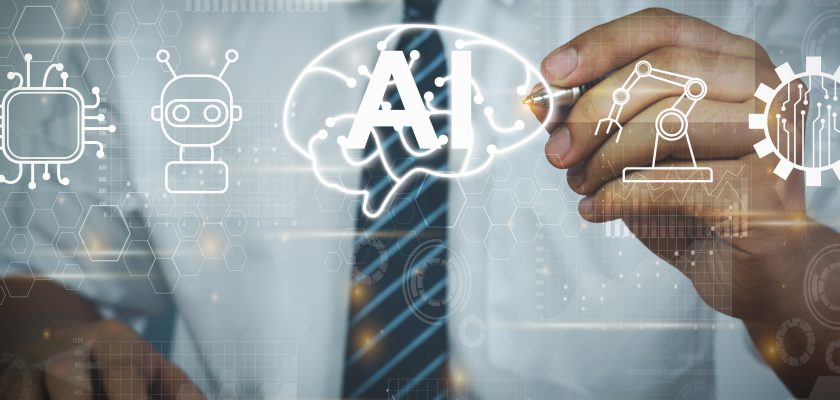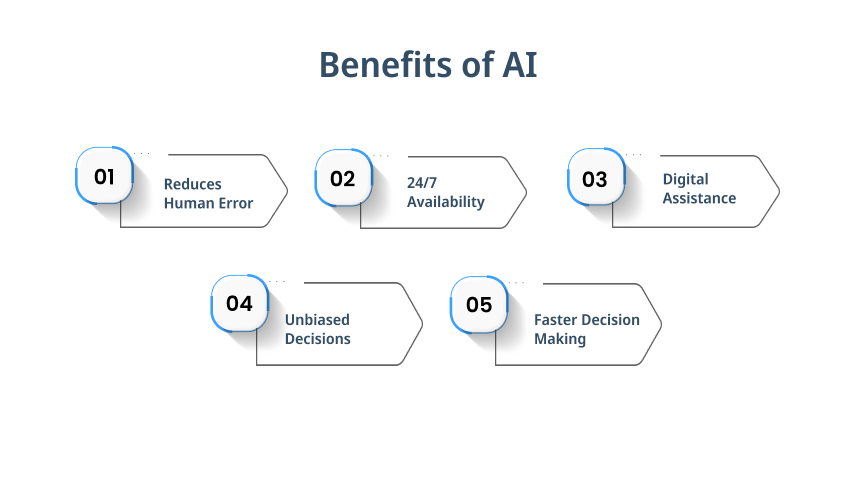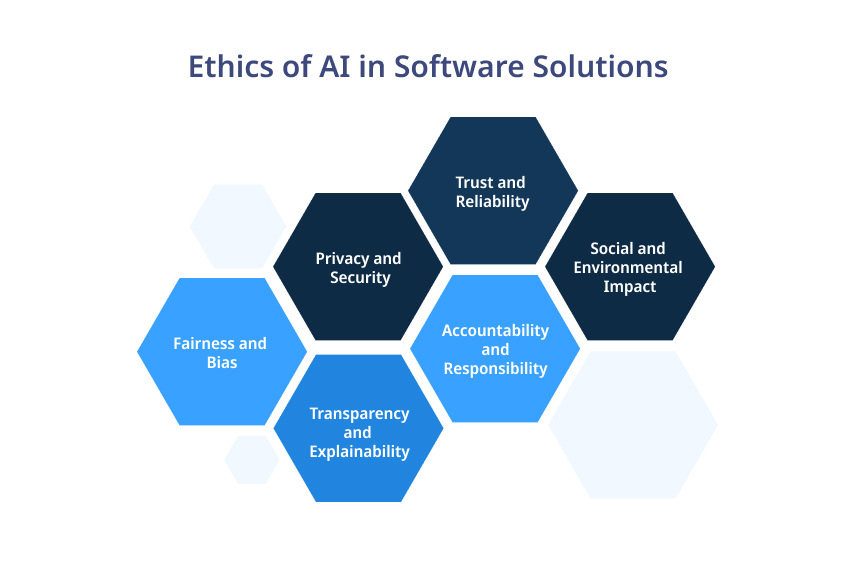Artificial Intelligence has drastically changed the world we live in. It is transforming industries and improving our daily lives with technologies like virtual assistants and self-driving automobiles.
According to Market.us, the Artificial Intelligence Market is anticipated to grow exponentially in the next decade, increasing from USD 94.5 billion in 2021 to over USD 2,967.42 billion by 2032.
However, as AI becomes more popular, we must consider the ethical implications of its development and usage. In this blog, we’ll examine the benefits of AI and the ethics of AI in software solutions.
Benefits of AI
AI has revolutionized various industries, streamlined procedures, and offered creative answers to complex problems. Here are some benefits of Artificial Intelligence.
-
Reduces Human Error
Every decision AI makes is based on data already obtained and a specific set of algorithms. One benefit of AI is reducing errors and drastically improving accuracy and precision. When properly coded, these errors can be eliminated.
For example, robotic surgery systems can carry out complex procedures precisely and accurately. It reduces the risk of human error and improves patient safety in healthcare.
-
24/7 Availability
Humans are productive only about 7-9 hours a day. They also require breaks and time off to balance their personal and professional lives. But AI can operate continuously without rest. It can multitask with accuracy and think more quickly than humans. With AI algorithms, it is possible to do complex and repetitive tasks without difficulty.
For example, online customer care chatbots can provide customers with immediate assistance whenever and wherever required. Chatbots can provide prompt customer assistance around-the-clock by answering common queries, resolving issues, and escalating complex issues to human agents using AI and natural language processing.
-
Digital Assistance
Some renowned and technologically advanced businesses use digital assistants to interact with customers. Websites use digital assistants to deliver content requests. Some of these are curated so that it becomes challenging to distinguish between speaking with humans and chatbot. We can have a dialogue with the assistants about our search.
For example, companies that rely on customer care teams to respond to client’s queries can use AI to develop a chatbot or an assistant that can respond to all of their client’s inquiries.
-
Unbiased Decisions
Emotions drive human beings, whereas AI is emotionless and approaches problems practically and logically. It has the enormous benefit of being impartial, allowing for more precise decision-making.
An example is AI-powered hiring systems that evaluate job candidates based on their abilities and qualifications rather than their demographics. This eliminates the hiring process leading to a more inclusive and diverse workforce.
-
Faster Decision Making
AI can assist organizations in making quicker and more informed decisions by automating some tasks and offering real-time information. It can be beneficial in high-stakes situations where decisions must be made quickly and precisely to avoid expensive mistakes or save lives.
Using AI-powered predictive analytics in financial trading is one example of a speedier decision-making process. With this, algorithms can analyze enormous volumes of data in real time and make well-informed investment decisions more quickly than human traders, which improves returns and lowers risks.
-
Ethics of AI in Software Solutions
To ensure that AI is built and utilized ethically and responsibly, you need to understand the main elements of AI ethics.
-
Fairness and Bias
Promoting fairness and reducing bias are essential elements of ethical AI. The AI systems are only as impartial as the data they are educated on, and intentional biases can infiltrate the system. It’s critical to consider the variety of the data used to train the system and to conduct bias testing during the development phase to ensure that AI systems are created relatively.
Research suggests facial recognition software can be biased against particular racial and gender groups. For instance, the study found that while face recognition technology only made mistakes in 1% of white men, it misdiagnosed black women at a rate of 35%.
Some businesses are addressing this by building more diverse facial recognition algorithm training datasets and thoroughly checking for bias throughout development.
-
Transparency and Explainability
These two concepts are crucial ethical considerations when it comes to AI. With the increasing complexity of AI, stakeholders must understand how decisions are made.
In the healthcare industry, where AI makes crucial decisions about life and death, prioritizing transparency and explainability is even more critical.
Moreover, developers must document the decision-making process and provide access to the data to the stakeholders. Thankfully, tech giants like Google and Microsoft are setting the bar for developing tools that assist consumers in comprehending the reasoning behind AI judgments. We can increase confidence in the technology and ease worries about AI’s possible adverse effects by making the technology more visible and understandable.
-
Privacy and Security
Privacy and security are crucial components of ethical AI. As AI systems rely on personal data to make decisions, protecting the data from unauthorized access or criminal usage is essential.
Additionally, AI systems may be vulnerable to security threats like hacking, which could result in the misuse of personal information and other unfavorable effects.
To ensure privacy and security, developers must use robust security mechanisms, such as encryption and access controls, to secure sensitive data. In addition, AI systems should prioritize privacy considerations from the inception of their creation, and users must know how their data is being used. By prioritizing privacy and security in AI, we can advance ethical and reliable technology that is good for society.
-
Accountability and Responsibility
It’s critical to prioritize accountability and responsibility when developing and deploying AI systems as they become more autonomous. Determining who is accountable for the deliberations and decisions made by AI systems requires the development of precise regulations and processes.
To ensure accountability and responsibility, companies should have systems of checks and balances in place and procedures for identifying and resolving potential issues. It involves constant assessment of the effectiveness of AI systems and open discussion of potential drawbacks or dangers. By putting accountability and responsibility first, we can ensure that AI benefits society.
-
Trust and Reliability
To foster trust in AI systems, reliability and accuracy are essential. AI must be extensively tested and verified before it is used, and developers should follow the proper testing and validation methods.
One successful strategy is utilizing independent third-party testing that can look for any issues and improve the general performance of AI systems. Moreover, monitoring and updating AI systems can ensure long-term dependability and accuracy.
-
Social and Environmental Impact
AI systems should protect both people and the environment. As AI becomes more prominent, it’s essential to consider how it will affect society and the environment. To do this, designers must carefully consider and handle the potential effects of AI systems on employment, the economy, and the environment.
Moreover, organizations must be transparent about AI systems’ social and environmental impact and respond quickly to minimize adverse outcomes. If AI is developed and used responsibly, we can realize technology’s full promise while safeguarding our planet and its inhabitants.
Final Words
The development of AI systems has the potential to revolutionize several industries and improve our daily lives. However, it is crucial to consider new technologies’ ethical implications to ensure that they are created and applied with caution and responsibility. All stakeholders must work together to find a balance between innovation and accountability.
The government, businesses, developers, and individuals must cooperate to create a framework that prioritizes ethics and responsibility during AI development and deployment. By working together, we can build a bright, inventive but also moral and responsible future.


